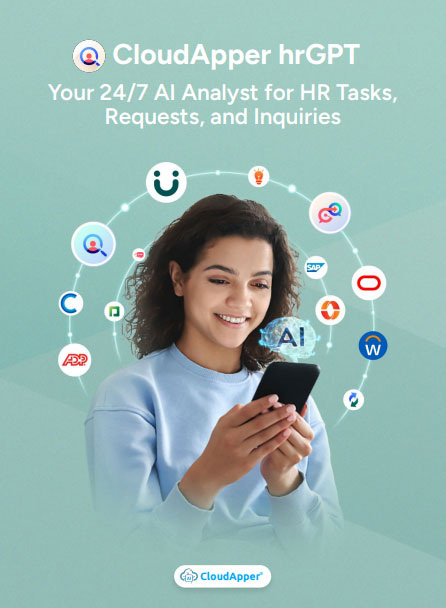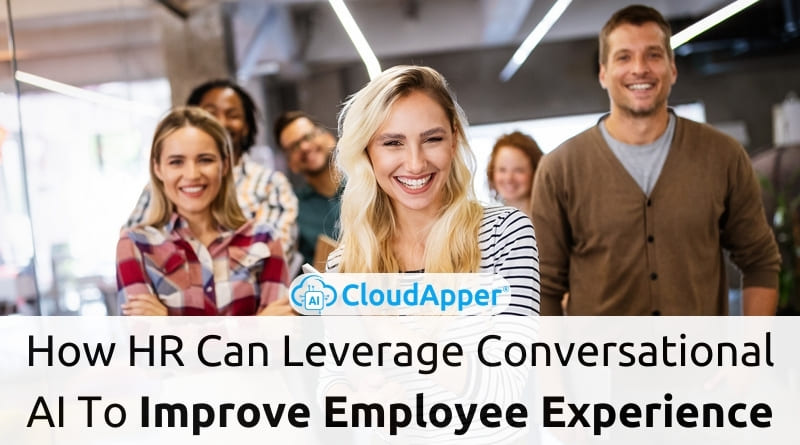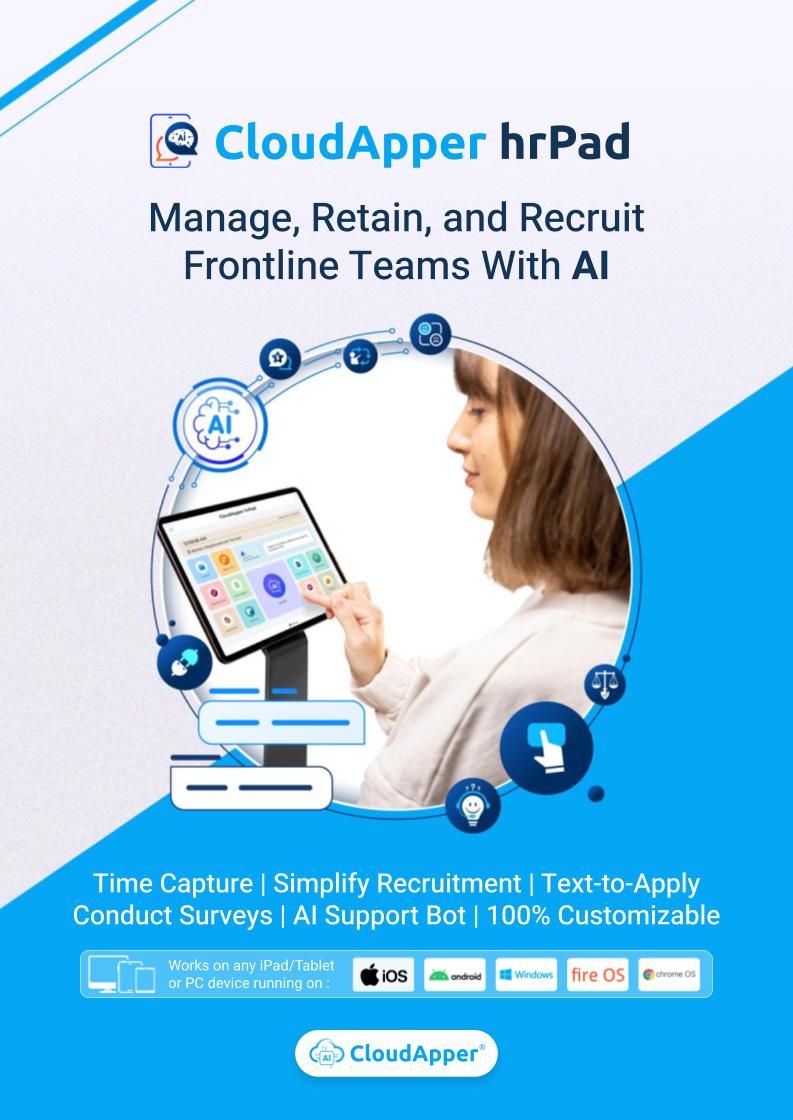Different organizations are utilizing AI in different ways. Find out how HR teams can leverage conversational AI using CloudApper hrGPT to automate HCM tasks, reduce the administrative burden, and improve the employee experience.
Table of Contents
In the always-evolving landscape of Human Resources, the challenges HR teams face are diverse, complex, and numerous, to say the least. From manual and time-consuming processes to the need for personalized employee interactions, the demands on HR professionals continue to grow – and it won’t stop anytime soon. In the cutthroat competitive environment, organizations are always trying to hire top talent away from competitors – HR teams need to stay constantly vigilant and adopt strategies to prevent that. One of the best ways to retain top employees is by working on employee experience – something that conversational AI can help with. That being said, let’s take a look at some responsibilities that can overwhelm HR teams, how AI can be used in HR, particularly conversational AI, and how CloudApper’s AI-powered HR assistant can streamline HR processes while improving the employee experience.
HR Responsibilities Can Be Overwhelming
Before diving right into how AI can be used in HR to streamline operations and improve employee experience, let’s take a look at what HR teams typically have to deal with to understand why they can get overburdened.
HR teams play a crucial role in any given organization as they have to manage a myriad of responsibilities related to personnel, policies, workplace culture, and employee experience. However, they often face several challenges that can impact both the efficiency and effectiveness of HR operations.
Here are some common problems that HR teams have to deal with:
Manual and Time-Consuming Processes
HR teams often grapple with manual tasks such as data entry, document processing, and paperwork. These time-consuming processes can divert resources from strategic initiatives and hinder overall productivity.
Data Management and Analysis
Managing vast amounts of employee data can be overwhelming. Extracting meaningful insights from this data for decision-making can be quite challenging, especially without the right tools and technologies.
Employee Engagement and Satisfaction
Ensuring high levels of employee engagement and satisfaction is an ongoing challenge. HR teams must find effective ways to communicate, motivate, and address the needs and concerns of a diverse workforce.
Talent Acquisition and Recruitment Challenges
Identifying and recruiting suitable candidates is a complex process. HR teams often face challenges in attracting top talent, streamlining the hiring process, and ensuring a positive candidate experience.
Benefits Administration Complexity
Administering employee benefits, such as healthcare, retirement plans, and other perks, involves intricate processes. HR teams must navigate complex regulations, communicate effectively about benefits, and manage enrollment procedures.
Compliance With Regulations
Staying compliant with ever-changing labor laws, regulations, and industry standards is a constant concern. HR teams must ensure that organizational policies align with legal requirements and industry best practices.
Employee Relations and Conflict Resolution
Addressing employee conflicts and grievances and maintaining positive employee relations requires a delicate balance. HR professionals must be adept at conflict resolution to foster a healthy work environment.
Performance Management and Evaluation
Evaluating employee performance and providing constructive feedback is crucial for professional development. However, creating fair and effective performance management systems can be challenging.
Workforce Planning and Succession Management
Anticipating future workforce needs and planning for succession are critical aspects of HR. Teams must ensure that there is a talent pipeline for key roles and that the organization is prepared for leadership changes.
Diversity and Inclusion Initiatives
Promoting diversity and inclusion has been a growing priority in recent years. HR teams face the challenge of creating inclusive policies, addressing bias, and fostering a diverse and equitable workplace.
Adapting to Technological Changes
The HR landscape is continually evolving with technological advancements. HR teams must adapt to new technologies to stay competitive and enhance operational efficiency.
As can be seen, HR teams have to juggle a lot of responsibilities. Understandably, all of these tasks can put considerable pressure – impacting the quality of work and productivity of HR teams and ultimately hampering the employee experience. However, conversational AI solutions like CloudApper’s hrGPT can reduce the immense pressure on HR teams, automate HCM tasks, enhance overall HR efficiency, and improve the employee experience.
CloudApper hrGPT – Your Newest HR Team Member!
CloudApper hrGPT emerges as a solution designed to optimize HR operations and reduce the administrative burden on HR teams thanks to its conversational AI capabilities. Our AI-powered HR assistant seamlessly integrates with any HR/HCM system, making it perfect for any organization wanting to adopt and leverage AI to automate HCM tasks. hrGPT easily tackles the challenges faced by HR teams, offering efficiency, accuracy, and a personalized employee experience.
Here are a few ways how AI can be used in HR processes and streamline operations.
How Conversational AI Can Be Utilized in HR
Automated Employee Query Management
hrGPT handles employee queries with natural language understanding, providing instant and accurate responses, reducing wait times, and enhancing overall employee satisfaction.
Providing Instant Responses Regarding Benefits
Streamlining benefits-related processes, hrGPT automates inquiries, enrollment, and communication of benefits-related information, ensuring efficiency and accuracy in benefits management.
Talent Acquisition Enhancement
Transforming the hiring process, CloudApper AI introduces a conversational AI approach to simplifying the recruitment process through AI resume screening, candidate ranking, 24/7 candidate support, and automated interview scheduling.
Employee Self-Service
Empowering employees with AI-driven conversations, hrGPT allows them to manage schedules, submit time-off requests, and access HR-related information, reducing the need for manual interventions. HrGPT automates HCM tasks – reducing the burden on HR teams.
While those were a few use cases of how AI can be used in HR processes for streamlining HR operations, let’s take a look at some of the benefits it provides for HR teams.
Benefits of CloudApper hrGPT for HR Teams
- Efficiency Gains: hrGPT automates routine HR tasks, reducing manual workloads and allowing HR teams to focus on strategic initiatives contributing to organizational success.
- Accuracy and Compliance: Automated HCM tasks reduce the risk of errors, ensuring accurate employee records, benefits administration, and compliance with HR regulations.
- Enhanced Employee Experience: By providing instant responses and personalized interactions, hrGPT contributes to an improved employee experience, fostering satisfaction and engagement.
- Scalability: As organizations grow, hrGPT provides a scalable solution that efficiently manages HR tasks for larger workforces, ensuring continued operational excellence.
Reduce the Administrative Burden of Your HR Teams With CloudApper hrGPT
AI-driven solutions like CloudApper hrGPT marks a pivotal moment in HR operations. By addressing HR teams’ challenges and unlocking new possibilities for efficiency and engagement, hrGPT paves the way for a future where HR professionals can thrive in their roles while automating repetitive tasks. As organizations adopt and leverage conversational AI, CloudApper hrGPT helps their HR teams take employee experience to the next level – toward a new era of optimization and excellence. Contact CloudApper AI now to learn about how we can help automate HCM tasks and improve the employee experience.
What is CloudApper AI Platform?
CloudApper AI is an advanced platform that enables organizations to integrate AI into their existing enterprise systems effortlessly, without the need for technical expertise, costly development, or upgrading the underlying infrastructure. By transforming legacy systems into AI-capable solutions, CloudApper allows companies to harness the power of Generative AI quickly and efficiently. This approach has been successfully implemented with leading systems like UKG, Workday, Oracle, Paradox, Amazon AWS Bedrock and can be applied across various industries, helping businesses enhance productivity, automate processes, and gain deeper insights without the usual complexities. With CloudApper AI, you can start experiencing the transformative benefits of AI today. Learn More

CloudApper AI Solutions for HR



- Works with








- and more.
Similar Posts

Best Practices for AI in Workforce Management: What Every HR…

Why HR Process Automation is the Future of Workforce Management







